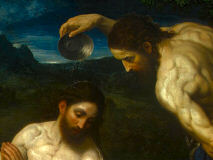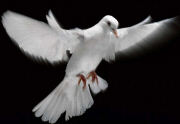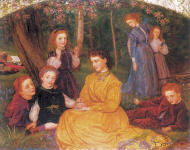“Those whose hearts are pure
are temples of the Holy Spirit.”
St. Lucy
The month of April is dedicated to the Holy Eucharist, and the the Holy Spirit
The month of April is dedicated both to devotion to the Eucharist and devotion to the Holy Spirit. This tradition has developed because Easter Sunday often falls in April, and when it does fall in March, the Easter season continues on through all of April.
The Holy Sacrament
To believe in the Holy Spirit is to profess that the Holy Spirit is one of the persons of the Holy Trinity, consubstantial with the Father and the Son: “with the Father and the Son he is worshipped and glorified.” (Catechism of the Catholic Church)
The Holy Spirit is the Person of Love in the life of God. He is also like a breath, an aspiration of infinite Love, from which we draw the breath of life.
On the day of Pentecost the Divine Spirit communicated such an abundance of life to the whole Church that to symbolize it “there came a sound from heaven, as of a violent wind coming, and it filled the whole house where they (the Apostles) were sitting.”
But it is also for us that the Holy Spirit has come, for the group in the Cenacle represented the whole Church. The Holy Spirit came to remain with the Church forever. This is the promise of Jesus Himself. He dwells in the Church permanently and unfailingly, performing in it without ceasing His action of life-giving and sanctification. He establishes the Church infallibly in the truth. It is He Who makes the Church blossom forth with a marvelous supernatural fruitfulness, for He brings to life and full fruition in Virgins, Martyrs, and Confessors those heroic virtues which are one of the marks of true sanctity.
(The Mysteries of the Rosary, Dom Columba Marmion, O.S.B.)
Name and Titles of the Holy Spirit
The Proper Name of the Holy Spirit
 “Holy Spirit” is the proper name of the one whom we adore and glorify with the Father and the Son. The Church has received this name from the Lord and professes it in the Baptism of her new children.
“Holy Spirit” is the proper name of the one whom we adore and glorify with the Father and the Son. The Church has received this name from the Lord and professes it in the Baptism of her new children.
The term “Spirit” translates the Hebrew word ruah, which in its primary sense, means breath, air, wind. Jesus indeed uses the sensory image of the wind to suggest to Nicodemus the transcendent newness of him who is personally God’s breath, the divine Spirit. On the other hand, “Spirit” and “Holy” are divine attributes common to the three divine persons. By joining the two terms, Scripture, liturgy, and theological language designate the inexpressible person of the Holy Spirit, without any possible equivocation with other uses of the terms “spirit” and “holy.”
Titles of the Holy Spirit
When he proclaims and promises the coming of the Holy Spirit, Jesus calls him the “Paraclete,” literally, “he who is called to one’s side,” ad-vocatus. “Paraclete” is commonly translated by “consoler,” and Jesus is the first consoler. The Lord also called the Holy Spirit “the Spirit of truth.”
Besides the proper name of “Holy Spirit,” which is most frequently used in the Acts of the Apostles and in the Epistles, we also find in St. Paul the titles: the Spirit of the promise, the Spirit of adoption, the Spirit of Christ, the Spirit of the Lord, and the Spirit of God — and, in St. Peter, the Spirit of glory.
Excerpted from the Catechism of the Catholic Church
Symbols of the Holy Spirit
 Water. The symbolism of water signifies the Holy Spirit’s action in Baptism.
Water. The symbolism of water signifies the Holy Spirit’s action in Baptism.
Anointing. The symbolism of anointing with oil also signifies the Holy Spirit, to the point of becoming a synonym for the Holy Spirit.
Fire. While water signifies birth and the fruitfulness of life given in the Holy Spirit, fire symbolizes the transforming energy of the Holy Spirit’s actions.
Cloud and light. These two images occur together in the manifestations of the Holy Spirit.
The seal is a symbol close to that of anointing. “The Father has set his seal” on Christ and also seals us in him.
The hand. Jesus heals the sick and blesses little children by laying hands on them. In his name the apostles will do the same. Even more pointedly, it is by the Apostles’ imposition of hands that the Holy Spirit is given.
The finger. “It is by the finger of God that [Jesus] cast out demons.” If God’s law was written on tablets of stone “by the finger of God,” then the “letter from Christ” entrusted to the care of the apostles, is written “with the Spirit of the living God, not on tablets of stone, but on tablets of human hearts.” The hymn Veni Creator Spiritus invokes the Holy Spirit as the “finger of the Father’s right hand.”
The dove. At the end of the flood, whose symbolism refers to Baptism, a dove released by Noah returns with a fresh olive-tree branch in its beak as a sign that the earth was again habitable. When Christ comes up from the water of his baptism, the Holy Spirit, in the form of a dove, comes down upon him and remains with him. The Spirit comes down and remains in the purified hearts of the baptized.
Excerpted from the Catechism of the Catholic Church
The Holy Spirit and Our Spiritual Life
 Everything depends on the Holy Spirit’s operation in us. The more fully we allow ourselves to be drawn and guided by the Holy Spirit, the closer we shall come to Jesus and His mysteries and graces. The Holy Spirit must draw us to every good thought, word and deed. Every act of faith, of hope and of love for God requires the inspiration and help of the Holy Spirit. If our virtues and our deeds are to be truly perfect and worthy of God, they need the special and continual touch of the Holy Spirit. Even though we are endowed with all the supernatural virtues, we still remain mere apprentices in the spiritual life. We know what we must do; and yet lack the virtue and the faculty to perform these things with ease. The Holy Spirit must guide us. He must seize our intellect and our wills and guide us in prayer, in work, in the decisions we have to make, and in the difficulties we encounter every day. He must share with us His manner of seeing, of loving, of thinking, and of working.
Everything depends on the Holy Spirit’s operation in us. The more fully we allow ourselves to be drawn and guided by the Holy Spirit, the closer we shall come to Jesus and His mysteries and graces. The Holy Spirit must draw us to every good thought, word and deed. Every act of faith, of hope and of love for God requires the inspiration and help of the Holy Spirit. If our virtues and our deeds are to be truly perfect and worthy of God, they need the special and continual touch of the Holy Spirit. Even though we are endowed with all the supernatural virtues, we still remain mere apprentices in the spiritual life. We know what we must do; and yet lack the virtue and the faculty to perform these things with ease. The Holy Spirit must guide us. He must seize our intellect and our wills and guide us in prayer, in work, in the decisions we have to make, and in the difficulties we encounter every day. He must share with us His manner of seeing, of loving, of thinking, and of working.
Our works and our conduct will be perfect only when the Holy Spirit has taken complete possession of us. Therefore, in addition to the supernatural virtues of faith, hope, charity, justice, fortitude, temperance and wisdom, He gives us also His seven gifts. Thus He equips the tiny boat of our soul with sails upon which He Himself, the Spirit of God, blows. Our progress across the sea of life is then no longer slow and painful. We are propelled and guided by the Spirit. If the Spirit of God breathes upon the sails of our boat, then our journey will be a happy one. Then through the work and the help of the Holy Spirit, who lives in our soul, we shall come to the Father.
Excerpted from the The Light of the World by Benedict Baur, O.S.B.
Veni, Creator Spiritus (Come Holy Spirit, Creator Blest)
One of the most widely used hymns in the Church, Veni, Creator Spiritus, is attributed to Rabanus Maurus; (776-856). It is used at Vespers, Pentecost, Dedication of a Church, Confirmation, and Holy Orders and whenever the Holy Spirit is solemnly invoked. A partial indulgence is granted to the faithful who recite it. A plenary indulgence is granted if it is recited on January 1st or on the feast of Pentecost.
Come, Holy Spirit, Creator blest, and in our souls take up Thy rest; come with Thy grace and heavenly aid to fill the hearts which Thou hast made.
O comforter, to Thee we cry, O heavenly gift of God Most High, O fount of life and fire of love, and sweet anointing from above.
Thou in Thy sevenfold gifts are known; Thou, finger of God’s hand we own; Thou, promise of the Father, Thou Who dost the tongue with power imbue.
Kindle our sense from above, and make our hearts o’erflow with love; with patience firm and virtue high the weakness of our flesh supply.
Far from us drive the foe we dread, and grant us Thy peace instead; so shall we not, with Thee for guide, turn from the path of life aside.
Oh, may Thy grace on us bestow the Father and the Son to know; and Thee, through endless times confessed, of both the eternal Spirit blest.
Now to the Father and the Son, Who rose from death, be glory given, with Thou, O Holy Comforter, henceforth by all in earth and heaven. Amen.